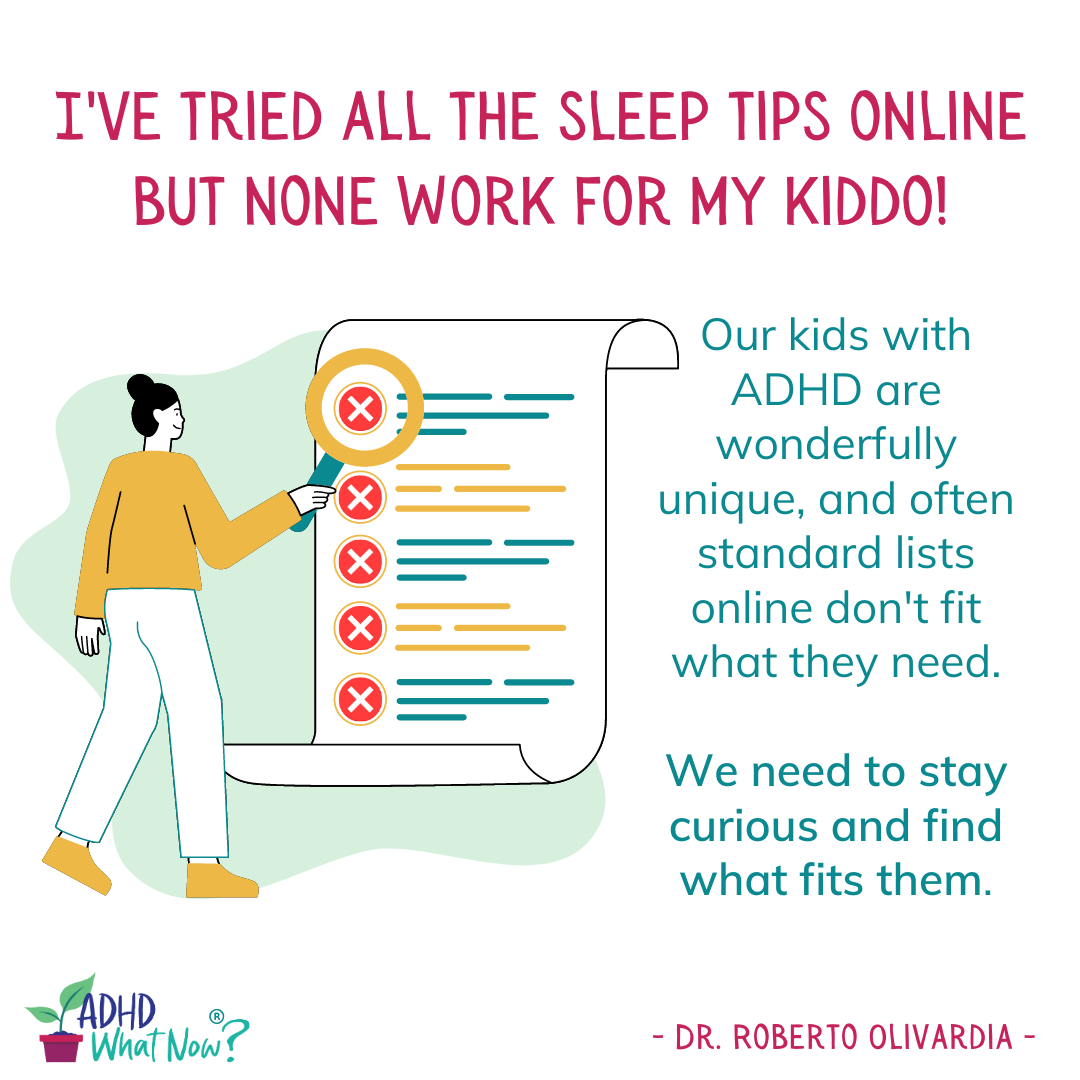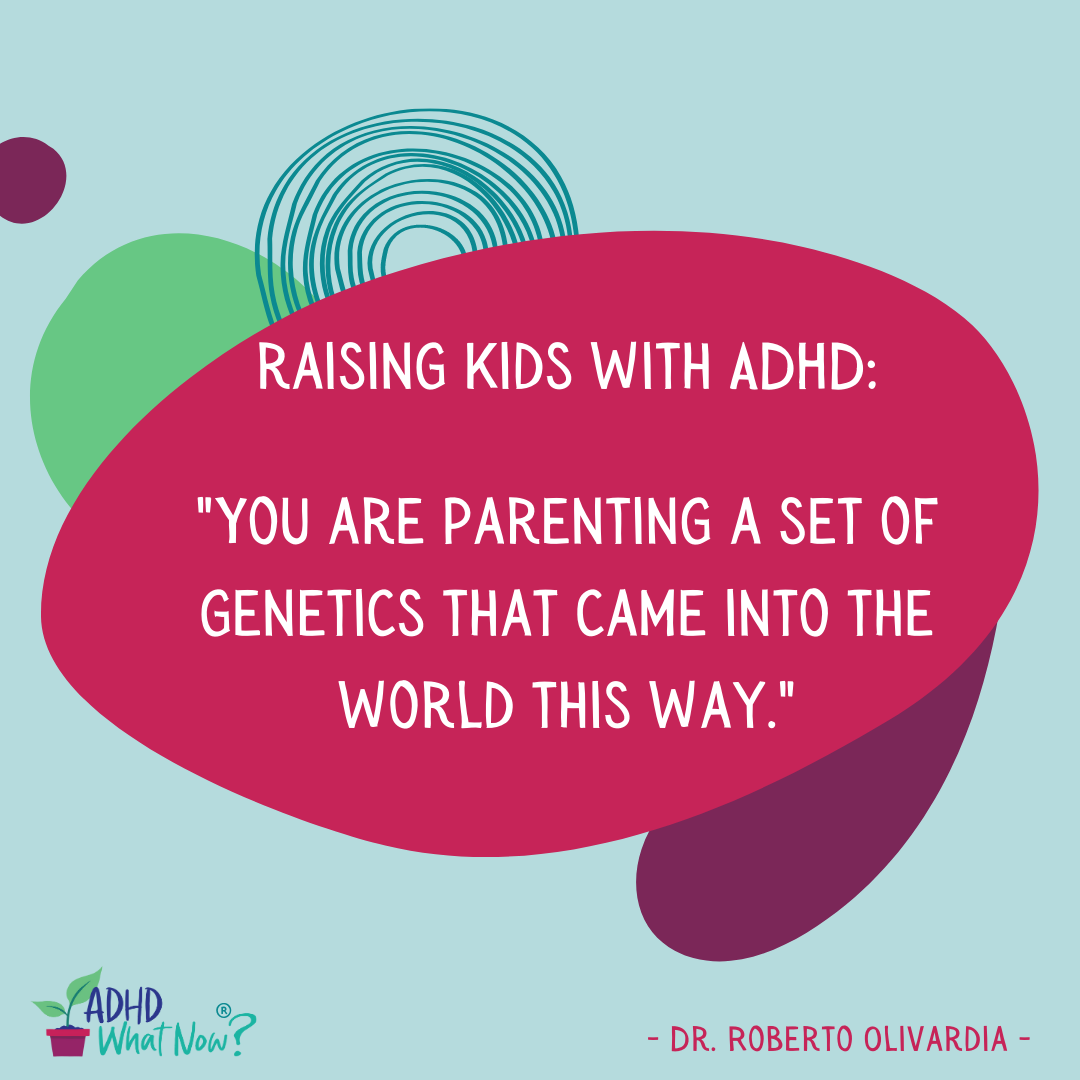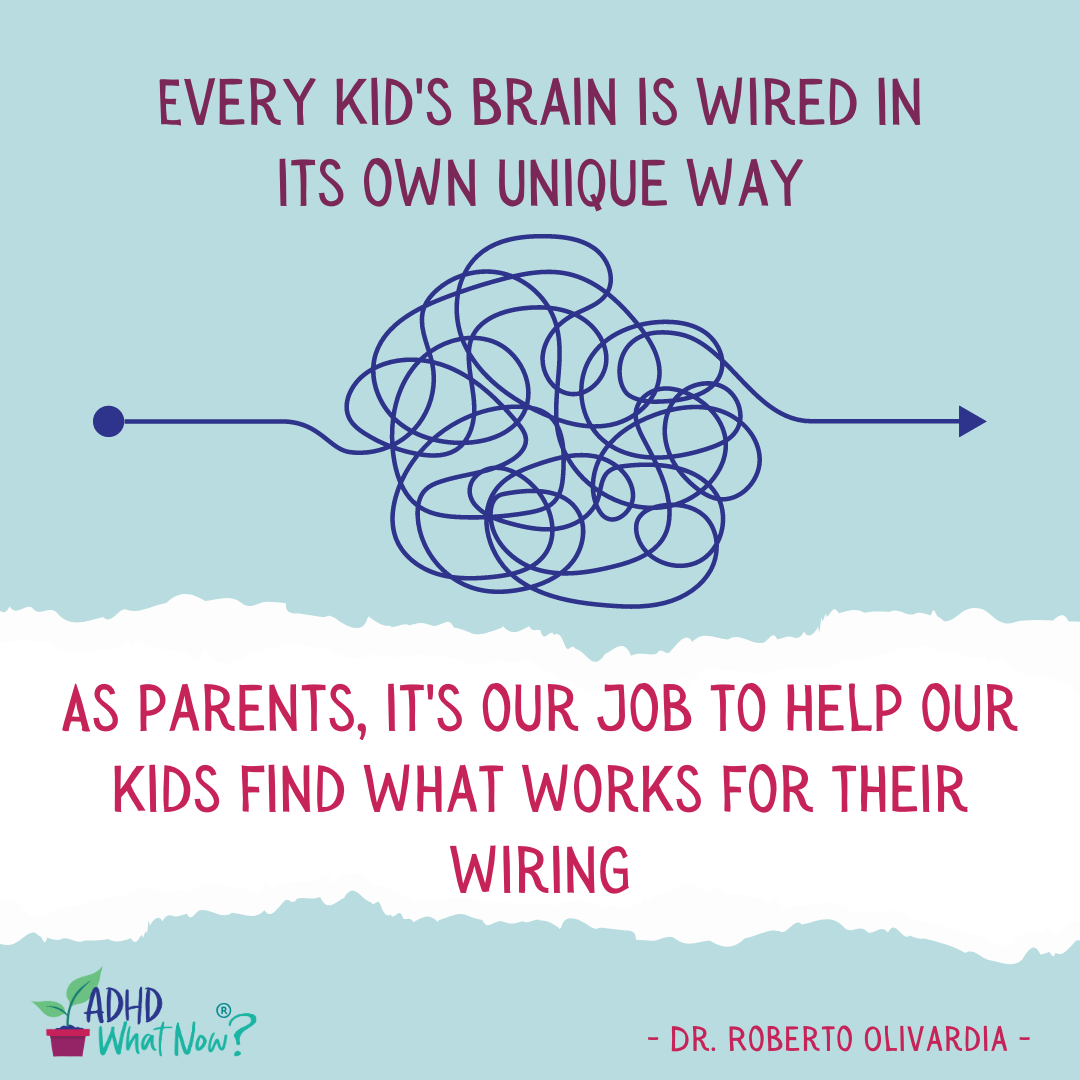Bedtime Crazy? How to Help Your Child with ADHD Sleep
Jul 19, 2023Dr. Roberto Olivardia offers advice on how to best uncover the strategies that help your kid with ADHD sleep better. He offers some great insights on how we as parents can help our kids find what will help them, because it's different for each of our unique kiddos.
Some of his tips include accepting that their sleep needs may be different than what is typical, harnessing curiosity to find what works, trying different strategies, understanding it won't work for everyone, and finding grace if it doesn't.
Shareable Graphics




Full Transcript
Veronica: Does your child with ADHD have difficulty falling asleep? You know how important sleep is for them to be having their full performance in life. And plus, you really want that downtime at the end of the day. In fact, you need it in order to finish off the day and get some recuperative sleep for yourself as well.
But you've tried the sleep diets or you've tried to search online for what works and what works for other people doesn't seem to be working in general for you.
And so I think there's two steps really; first to accept that it can look different than the typical advice of shut down all screens and shut down all activities and slow down at the end of the day before falling to sleep. It might be different.
And so in this conversation that you're can hear with Dr. Roberto Olivardia, he's going to share examples and stories that will help to broaden the horizons as far as what might be strategies that you could try with your kiddo that are effective for kids with ADHD, and to dig into getting curious of what works for your child.
As a result, you might find exactly how to help your kiddo get to sleep, and you can then experience more time of rest for yourself at the end of the day so you can reset and be ready fresh for the next day. So enjoy this conversation and I'll see you on the other side.
If you go online and Google Sleep Diet, right? Like, and you get a list of everywhere, it'll say like the same 10 things. Like it might not be those 10 things that'll work for you as you gave different examples of. So I could ask you like, so what are the things that'll work? But the answer is like, it's different for everybody, right?
Dr. Olivardia: It's so different for -- absolutely. And I think curiosity is that like it's an element that so many, I mean, to me is so inherent in ADHD because we're always seeking stimulation. That curiosity is this natural -- so we can use that. It's almost like, let's harness that to help that person with their ADHD and to see what works.
Like I've had, I mean, you know, patients who have told me about like listening to Harry Potter audiobook helps them fall asleep because they've listened to it, you know, multiple times. Sometimes it could be having a television show in the background that they've seen a hundred times that they're not really like paying attention to.
Sometimes it's sleeping, like I sleep with a wedge pillow, so I sleep like this at an incline because for whatever reason, when I sleep like this, if this were my head, I feel like I'm like this. I can't explain it. I don't, it's probably something in my brain, but even as a kid, I would always prop up pillows so I would sleep at an angle and makes me fall asleep better.
So sometimes it could be things that might seem a little bit unusual, you know, in that kind of way. But it's, my motto is, as long as it doesn't hurt you or anyone else, just, you know, you go for it. Like whatever you know is going to work. Sometimes having, you know, chamomile tea helps, sometimes reading a book.
Now for me, for example, like when they say, oh, you know, have like a book by your bed, that doesn't work for me because if I'm really interested in it, it's gonna be very hard for me to put that book down. And if I'm not interested in it, I'm not even going to engage in reading that book.
So that's an example of something you might see on those lists of like, oh, you know, you read a little bit before you go to bed, doesn't work for me. That doesn't mean it's not going to work for you or you know, for your child or whatnot.
So it's, you know, taking those suggestions and saying, okay, well let's try these.
But sometimes the thing might be, and it sounds weird, like have your kid maybe like, I live in a cul-de-sac and when my, you know, when my kids were like five, six, sometimes at eight, nine o'clock at night, we would run around that cul-de-sac. I mean my son, we would have like, you know, touch all the mailboxes, the cul-de-sac. And of course my neighbors were like, what is going on? I mean, they thought, you know, I mean they're great neighbors, but they're probably like, why is he running around? But it would tire him out, you know?
And the same way that I'm sure a lot of parents, again, parents who have kids with ADHD as well as parents that don't have kids with ADHD, sometimes, like if your baby can't fall asleep, you strap them in the car seat and you drive around the neighborhood and the motion of the car, you know, you might hear from parents who put their kids on their washing machine and did a load of laundry and the rumble of the washing machine actually calmed their baby down.
I mean, this is something that is like hardwired. And that's the other thing that's so important for parents because we all know we're hard on ourselves as parents because we want the best for our children. We wanna do the best. But it's so important for parents to understand this is not their fault.
They're not like, you know, they could be like, my wife who doesn't have ADHD would be in, you know, mom groups and everything where, you know, their kids would sit in circle time and my kid never sat down in circle time. And frankly I understood why he wasn't, because he was, you know, exploring all the cool things that were outside of circle time.
But you know, my wife would sometimes be like, what is like wrong with me that my kid can't? And I was like, no, there's not, this is like beyond you. Like this is just genetics, like at play.
I mean, and we joke that, you know, my son was diagnosed prenatally with ADHD because it was pretty evident every, you know, in the womb there was a lot of energy. I mean, every time he had an ultrasound, every time the tech would be like, whoa, you got an active, you know, kid. And he came into the world a week early and was dramatic. I mean, he's his father's son.
I mean, and so, but as a parent you have to know like, okay, this isn't like a fault or blame like you are parenting a set of genetics that just came into the world, you know, that way.
And sleep is one of those things that studies show as infants that people who are later diagnosed with ADHD, that the parents of those kids will retrospectively say, yes, it was harder to soothe that child. It was harder to get them to sleep. They might have higher rates of colic. I had to do these unconventional things.
Like you see it at very, very young ages. And so it's understanding that this is their wiring and you're trying to figure out a way to kind of work with that wiring.
Veronica: I just love Dr. Roberto Olivardia. I think his insights are tremendous and as I had mentioned, his experience is phenomenal in supporting people, so grateful for his insights and wisdom.
If you are looking to fully support your young child with ADHD so that they can live their best life and you can enjoy the journey as a parent, then I'd encourage you to go to WhatNowADHD.com. There you'll find a free resource of those strategies that parents can use for how to set up full support for your kiddo.
Because when 'how' is easy, your precious time and energy can go to actually helping your kiddo and family to flourish.